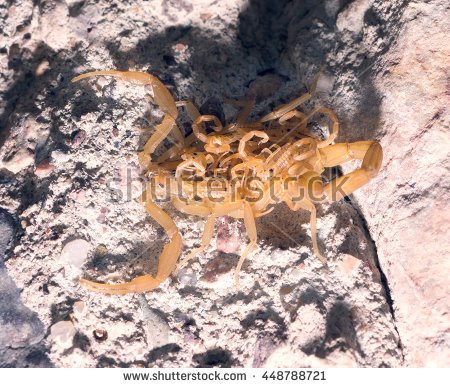ARIZONA BARK SCORPION - DAILY CELESTIAL CHALLENGE ( TUESDAY - ANIMAL KINGDOM )
The Arizona bark scorpion is a small light brown scorpion common to the Sonora Desert in southwest United States and northwestern Mexico. An adult male can reach 8 cm in length (3.14 inches), while a female is slightly smaller, with a maximum length of 7 cm (2.75 inches).

DIET
The bark scorpion is nocturnal and prefers to ambush its prey, usually feeding on crickets, roaches, beetles, and other small insects. Bark scorpions can also be cannibalistic, occasionally feeding on a fellow scorpion
LIFE CYCLE
Arizona bark scorpions have a gestation period of several months, are born live, and are gently guided onto their mother's back. The female usually gives birth to anywhere from 25 to 35 young. These remain with their mother until their first molt, which can be up to 3 weeks after birth. Arizona bark scorpions may live up to 6 years.
While nearly all scorpions are solitary, the Arizona bark scorpion is a rare exception: during winter, packs of 20 to 30 scorpions can congregate.
VENOM
The bark scorpion is the most venomous scorpion in North America, and its venom can cause severe pain (coupled with numbness, tingling, and vomiting) in adult humans, typically lasting between 24 and 72 hours. Temporary dysfunction in the area stung is common; e.g. a hand or possibly arm can be immobilized or experience convulsions. It also may cause loss of breath for a short time. Due to the extreme pain induced, many victims describe sensations of electrical jolts after envenomation.
ANTI-VENOM
An antivenom was developed for this species at Arizona State University, and produced in quantities sufficient to treat individuals within the state of Arizona. This antivenom was not FDA approved, but use within the state of Arizona was allowable and very successful in shortening the duration of symptoms and hospitalization. Production of this antivenom ceased by 2000 and the product was unavailable by 2004. A Mexican-produced antivenom, Anascorp [Antivenin Centruroides (scorpion), Laboratories received FDA approval on August 3, 2011 and is now in use
FIRST AID
Basic first aid measures can be used to help re-mediate scorpion stings:
- Clean sting site with soap and water
- Apply a cool compress (cool cloth)
- Take acetaminophen (also known as paracetamol) or ibuprofen for local pain and swelling
NOTE
this picture is not taking by me i copied it from pixabay. @sirknight started a daily celestial challenge and its daily themes are
SUNDAY : LIGHT
MONDAY : DARKNESS
TUESDAY : ANIMALKINGDOM
WEDNESDAY : STRUCTURES
THURSDAY : FORCESINNATURE
FRIDAY : LOVEBEAUTYFREEDOM
SATURDAY : STRUCTURE.
World of Photography Beta V1.0
>Learn more here<
Thank you for participating in #animalphotography, the weekly selection will be released on Tuesday.
You have earned 5.05 XP for sharing your photo!
Daily photos: 1/2
Daily comments: 0/5
Multiplier: 1.01
Server time: 16:12:50
Total XP: 15.15/100.00
Total Photos: 3
Total comments: 0
Total contest wins: 0
Follow: @photocontests
Join the Discord channel: click!
Play and win SBD: @fairlotto
Developed and sponsored by: @juliank